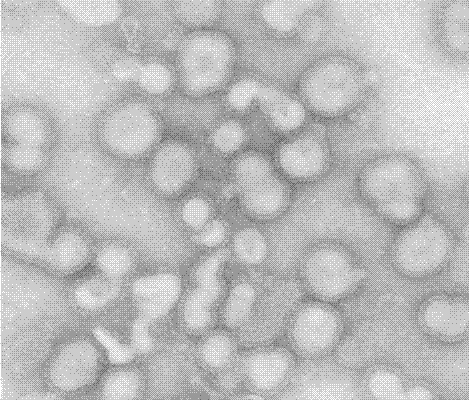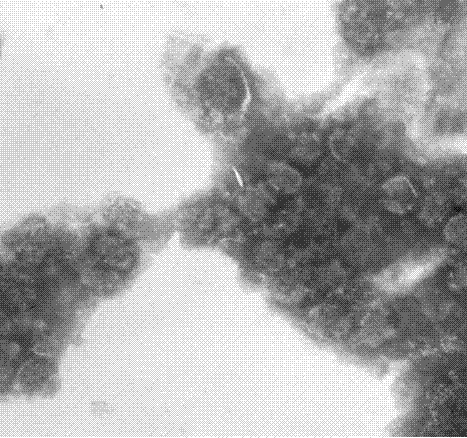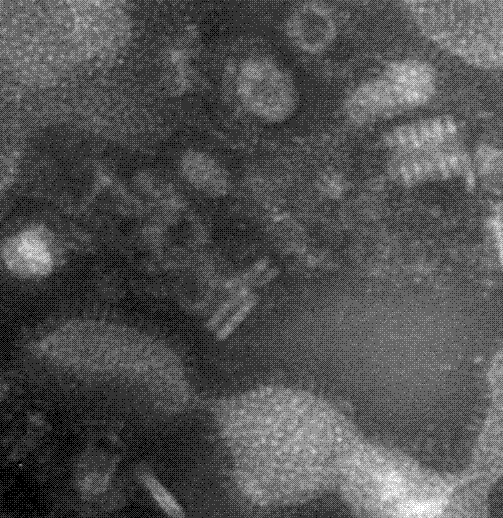Virus split deactivation method for human influenza virus split vaccine
An influenza virus inactivation technology, applied in antiviral agents, pharmaceutical formulations, inactivation/attenuation, etc., can solve the problems of poor uniformity and stability of inactivation, poor virus lysis effect, and many inactivation steps , to achieve the effect of shortening the inactivation time, improving the cracking effect, uniform and thorough cracking
- Summary
- Abstract
- Description
- Claims
- Application Information
AI Technical Summary
Problems solved by technology
Method used
Image
Examples
Embodiment 1
[0046] Example 1 Production of monovalent stock solution of H1N1 influenza virus
[0047] 1) Chicken embryos for production
[0048] The chicken embryos used for subculture and preparation of virus seeds should come from SPF chickens; the chicken embryos used for vaccine production should come from healthy chickens raised in closed houses, and 9-11 days old chickens with no deformities, clear blood vessels, and activities should be selected. Embryo.
[0049] 2) Virus inoculation and cultivation
[0050] Use PBS (0.01 mol / L, pH 7.2) to dilute the working seed batch virus seeds, and the H1N1 virus seeds are diluted to 4.0LgEID50 / ml. Inoculate the allantoic cavity of chicken embryos, 0.2ml per embryo. Incubate at 33-35°C for 44-48 hours. If the working seeds are not used up after being thawed, they should not be frozen for further use.
[0051] 3) Virus Harvest
[0052] Screen the live chicken embryos, place the embryos at 2-8°C for 12-18 hours, harvest the allantoic fluid ...
Embodiment 2
[0083] Example 2 Production of monovalent stock solution of H3N2 influenza virus
[0084] 1) Chicken embryos for production
[0085] The chicken embryos used for subculture and preparation of virus seeds should come from SPF chickens; the chicken embryos used for vaccine production should come from healthy chickens raised in closed houses, and 9-11 days old chickens with no deformities, clear blood vessels, and activities should be selected. Embryo.
[0086] 2) Virus inoculation and cultivation
[0087] Use PBS (0.01 mol / L, pH 7.2) to dilute the batch virus seeds of the working seeds, dilute the H3N2 type virus seeds to 4.0LgEID50 / ml, inoculate the allantoic cavity of chicken embryos, inoculate 0.2ml per embryo, and culture at 33-35°C for 44- For 48 hours, if the working seeds and poisonous seeds are melted, if they are not used up at one time, they must not be frozen for further use.
[0088] 3) Virus Harvest
[0089] Screen the live chicken embryos, place the embryos at ...
Embodiment 3
[0120] Example 3 Production of Influenza B Monovalent Stock Solution
[0121] 1) Chicken embryos for production
[0122] The chicken embryos used for subculture and preparation of virus seeds should come from SPF chickens; the chicken embryos used for vaccine production should come from healthy chickens raised in closed houses, and 9-11 days old chickens with no deformities, clear blood vessels, and activities should be selected. Embryo.
[0123] 2) Virus inoculation and cultivation
[0124] Use PBS (0.01 mol / L, pH7.2) to dilute the working seed batch virus, dilute the type B virus to a virus amount of 3.0 LgEID50 / ml, inoculate the allantoic cavity of chicken embryos, inoculate 0.2ml per embryo, and place at 33- Incubate at 35°C for 66-72 hours. If the working seeds have been thawed and are not used up once, they must not be frozen for further use.
[0125] 3) Virus Harvest
[0126] Screen the live chicken embryos, place the embryos at 2-8°C for 12-18 hours, harvest the al...
PUM
 Login to View More
Login to View More Abstract
Description
Claims
Application Information
 Login to View More
Login to View More - Generate Ideas
- Intellectual Property
- Life Sciences
- Materials
- Tech Scout
- Unparalleled Data Quality
- Higher Quality Content
- 60% Fewer Hallucinations
Browse by: Latest US Patents, China's latest patents, Technical Efficacy Thesaurus, Application Domain, Technology Topic, Popular Technical Reports.
© 2025 PatSnap. All rights reserved.Legal|Privacy policy|Modern Slavery Act Transparency Statement|Sitemap|About US| Contact US: help@patsnap.com



